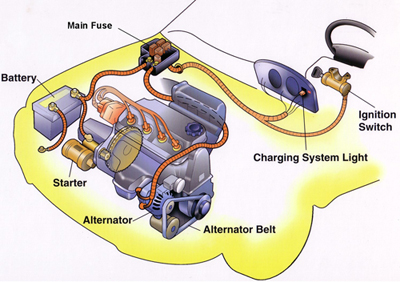5 Common Potential Reasons Your Car Won’t Start

Today, we rely on our cars for several different things, such as getting to work on time, making sure that the kids get to school in the morning, visiting friends and family, and picking up groceries, to name just a few. So, it’s easy to see why a car that refuses to start can pose a huge problem for most drivers. If you rely on your car to get you from A to B, nothing happening when you turn the key in the ignition can cause a massive disruption to your daily routine. Thankfully, when it comes to non-starting, there are several common reasons which are usually to blame. Here are five of the most common potential reasons for why you can’t start your car, and what to do to rectify them.

Reason #1. Dead or Failing Battery
When it comes to a car that refuses to start, the most common reason is that the battery that is failing or completely dead. There are various reasons as to why your car’s battery may be dead or dying. In some cases, this can be down to driver error. For example, if you have left your car switched off but have forgotten to turn off your headlights or another electronic feature inside the car, this will drain battery power when the alternator is not running.
In most cases, it’s easy to get your car re-started again with a simple jump start, using another car and jump leads. If you do not have access to another vehicle to use, then you may also be able to bump start your car. However, bear in mind that battery issues will need a little more work. Often, a replacement is required for weak or faulty car batteries (see hardwarexpress for a battery finder tool that will help you find a replacement). Or, you will need to see a mechanic if your car’s battery is draining when you are sure you have switched everything off.
Reason #2. Faulty Ignition Switch
If you are sure that there are no problems with your car’s battery, for example, if you have just had a brand new one fitted, then you might want to consider having the ignition switch checked for problems. There are some methods of narrowing down the problem to determine whether the ignition switch is the most likely culprit. You can do this by turning the key in the ignition and then switch on your headlights. Because it is the battery that controls the headlights and your dashboard, if these turn on but your engine still does not start, then your ignition is most likely to be at fault.
Reason #3. Clogged Fuel Filter
Since your engine needs an intake of fuel to be able to start and run efficiently, if there are no problems with your battery or ignition switch, then you might want to consider the possibility that fuel is unable to reach the engine. The most common reason for this will be a clogged fuel filter, which is preventing your fuel travelling from the tank and to the engine. If you have not had your fuel filters changed for a while, then they are more susceptible to getting clogged and blocked. Ideally, you should have the filters changed every 10,000 – 15,000 miles.
Reason #4. Broken Starter:
If the fault does not lie with your battery, then another potential reason to consider is a broken starter. The starter is the part that provides the necessary amount of force to get the engine started; when it malfunctions, the engine will find it very difficult to get going. The way to check whether it could be the starter causing your engine to fail is similar to checking for a bad ignition – if the electrical components of the car are working correctly, then it’s unlikely that a battery problem is to blame. You should also look out for any clicking sounds when trying to start your car, which usually indicates an issue with the starter.
Reason #5. Empty Fuel Tank
Lastly, a common reason for a car that won’t start is simply because there’s no fuel left in the tank. If you were running on a low tank and forgot to refuel your car, then you will need more fuel to get it started again. Or, if you weren’t aware that your car didn’t have enough fuel left, then you might want to have it checked to ensure that your fuel gauge is working correctly. Bear in mind that driver error, such as forgetting to refill the fuel tank or leaving electricals on when the engine is switched off, are more common causes than you may realise when an engine won’t start!
Have you ever been unable to start your car? What was the reason? We’d love to hear from you in the comments.


